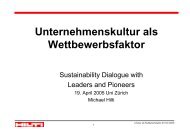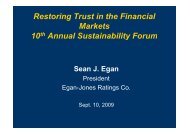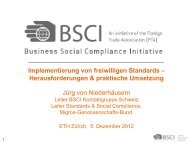Fostering Corporate Responsibility through Self- and Co-regulation
Fostering Corporate Responsibility through Self- and Co-regulation
Fostering Corporate Responsibility through Self- and Co-regulation
You also want an ePaper? Increase the reach of your titles
YUMPU automatically turns print PDFs into web optimized ePapers that Google loves.
1. The need for policy innovations<br />
1. The need for policy innovations<br />
There is a need for new<br />
governance mechanisms<br />
<strong>and</strong> policy innovations<br />
at all levels to tackle the<br />
governance challenge.<br />
The governance challenge<br />
Today’s societal challenges, such as climate <strong>and</strong><br />
demographic change <strong>and</strong> the scarcity of natural<br />
resources, have been increasingly shaping<br />
the public debate on sustainable development<br />
<strong>and</strong> the provision of common goods. Traditionally,<br />
it has been the responsibility of public actors<br />
to deal with such challenges. However, the<br />
latter are complex, interconnected <strong>and</strong> systemic<br />
in nature <strong>and</strong> can hardly be addressed by national<br />
governments alone. 2<br />
Firstly, unilateral actions by national governments<br />
<strong>through</strong> traditional governing approaches<br />
are not effective <strong>and</strong> sufficient anymore<br />
to solve such complex problems. Secondly,<br />
governments might often need the capacity <strong>and</strong><br />
resources of businesses, such as expertise, innovation<br />
potential <strong>and</strong> financial means, in<br />
order to adequately address these challenges.<br />
Lastly, tackling sustainable-development issues<br />
requires an inclusive <strong>and</strong> collaborative approach<br />
if it is to foster legitimate governance,<br />
political effectiveness <strong>and</strong> policy efficiency. 3<br />
Given these factors, there is a gap between<br />
public actors' capabilities to cope with sustainability<br />
issues <strong>and</strong> the societal expectations. In<br />
order to close this gap, there is a need for new<br />
governance mechanisms <strong>and</strong> institutional arrangements<br />
at different levels. The latter refer<br />
especially to the inclusion of private actors (e.g.,<br />
companies <strong>and</strong> CSOs) in alternative governance<br />
structures <strong>and</strong> processes to address the abovementioned<br />
challenges. At least since the 2002<br />
World Summit on Sustainable Development in<br />
Johannesburg, public-private collaboration has<br />
been identified as a new paradigm for tackling<br />
global societal challenges. 4 Ten years later, the<br />
final declaration of the Rio+20 conference has<br />
emphasised that “the implementation of sustainable<br />
development will depend on active engagement<br />
of both the public <strong>and</strong> private sectors”.<br />
5<br />
<strong>Co</strong>llective business engagement<br />
Empirical observations indicate that the private<br />
sector has been active in tackling sustainability<br />
challenges <strong>through</strong> responsible behaviour. This<br />
is especially true for companies whose efforts<br />
(referred to as CR) relate to three levels: (1) core<br />
business operations, (2) relations with local<br />
communities <strong>and</strong> (3) public policy <strong>and</strong> framework<br />
conditions of business operations. In fact,<br />
companies have been showing more <strong>and</strong> more<br />
willingness to work for the common good. For<br />
instance, business representatives made more<br />
than 200 related commitments just at the <strong><strong>Co</strong>rporate</strong><br />
Sustainability Forum held in Rio de Janeiro<br />
in 2012. 6<br />
In this regard, there are at least two reasons<br />
why it is in companies’ long-term self-interest<br />
to collectively engage in addressing sustainability<br />
challenges: Firstly, in many cases, sustainable<br />
challenges endanger the enabling environment<br />
of private companies themselves.<br />
Through collaboration, business actors can create<br />
a level playing field or even avoid public <strong>regulation</strong>.<br />
Secondly, societal expectations related<br />
to business operations are rising. This is due<br />
to the impacts (negative externalities) in the<br />
communities <strong>and</strong> regions they operate in <strong>and</strong><br />
to the increasing involvement of private actors<br />
in the provision of common goods. As a result,<br />
<strong>through</strong> engagement, companies can increase<br />
the degree of trust within society <strong>and</strong> ensure<br />
their licence to operate.<br />
Although individual efforts of companies’ engagement<br />
might sometimes be effective, they<br />
often have a limited impact or lead to competi-<br />
8














